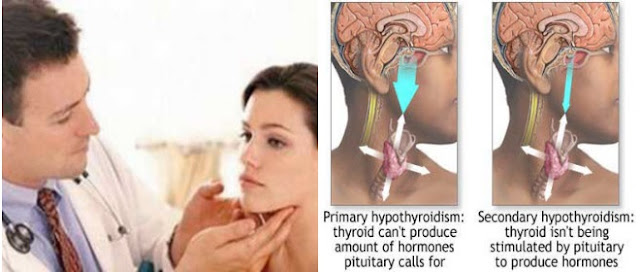The risk of developing hypothyroidism in women is much higher than that of men. The symptoms of hypothyroidism in women can be different from those in men and children. In my previous article, I have discussed in detail the functioning of the thyroid, hypothyroidism, hypothyroidism treatment, hypothyroidism medication (Click here to read). However, it has been observed that women are always at higher risk of developing hypothyroidism than men. So, I have decided to write this article on hypothyroidism in women. Please read till the end and send your feedback.
Hypothyroidism in women: Risk Factors, Symptoms, Treatment and Medication
Hypothyroidism Symptoms in Women
Hypothyroidism symptoms in women can be different from those in men, teens, and children. Generally, hypothyroidism most often affects middle-aged or older women. This underactive thyroid condition occurs when your thyroid gland stops producing enough hormones. Hashimoto thyroiditis is an autoimmune disease that commonly causes hypothyroidism. Radiation therapy can also trigger this condition.
The thyroid is a gland at the base of your neck that is shaped like a butterfly. It produces hormones that control your body’s use of energy. Your metabolism is dependent on having a normally functioning thyroid. Though it is rare, babies may be born with malfunctioning thyroids, or none at all, and young people on occasion will have an underactive thyroid. Their symptoms might include poor growth, delayed tooth development, poor mental development, or slow puberty.

Hypothyroidism in women: Symptoms, treatment, and medication
How do Symptoms of Hypothyroidism in Women Differ From that of in Men
In men, this disease may cause lethargy, a reduced sexual drive, and depression, as well as weakness in the muscles. It has been known to cause tenderness in a man’s breasts, swelling, and impotence. While it is rare to have thyroid cancer, if a man has tumors in his thyroid, it is usually malignant.
Hypothyroidism symptoms in women are many, though slow to develop. There are reasons why women suffer from this condition far more often than men do. For one thing, the biochemistry of their body is affected by their monthly cycles and accompanying hormonal fluctuations.
Women are more inclined to diet, and to try extreme methods for dropping pounds, that usually end up in binges, which causes a yo-yo effect. And their cravings for simple carbs, mainly chocolate, provide energy, and satisfaction. Unfortunately, this also decreases the metabolic rate. Emotions are also a factor. Women have a tendency to internalize stress, which also triggers the need for more carbs and more sweets. Some researchers believe that the thyroid then makes too much of the hormone.
Though we rarely suspect hypothyroidism, the symptoms in women are many, in spite of the fact that it may take months, or even years, for them to appear. If it shows up during or after a pregnancy, or when you are in crisis, you might easily mistake it for depression. If the onset is late in life, you might assume you have a condition noted for memory loss and confusion, such as dementia or Alzheimer’s disease.
Hypothyroidism in women is tied to hormone problems
The severity of your hormone deficiency will determine the number of symptoms you may have over the long run, but the onset will come slowly, with clues that are barely noticeable in the beginning. After all, when you are elderly, it is only natural to blame your age for those feelings of fatigue and sluggishness that you are beginning to experience.
But that is usually just the beginning. As the metabolism continues to slow down, there will be other more obvious changes that you will note. Hypothyroidism in women may include any or all of the following manifestations. We have already mentioned fatigue and sluggishness which are among the earliest signs.
Hypothyroidism Symptoms in Women: Facial Hair, Weight Gain, High Cholesterol and more
Facial, hair, and changes in the skin may occur as hypothyroidism symptoms in women. If you detect hoarseness in your voice, thinning eyebrows, eyelids that are drooping, swelling, and puffiness around your face, it is time to see a doctor about the possibility. The skin on your palms may turn faintly orange, and your hair, nails, and skin may get very dry and pale, or even feel hard or brittle to the touch.
Unexplainable depression that lasts for a long period of time is also a symptom. It can include sadness, loneliness, and not caring about what is going on around you. Fortunately, this feeling usually goes away once you are on medication for the thyroid condition.
You might be feeling weak and sore muscles that are tender and stiff for no good reason. You think it might be arthritic inflammation, but if other of these symptoms are also occurring, you need to see your physician. Your much-needed sleep may be disrupted by this pain.
Menstrual cycles may be more frequent, heavier, and more painful. Your skin might be cold to the touch, and it might seem difficult to get yourself comfortably warm.
However, if you are under hypothyroidism and you start sweating without reason, get very shaky, or begin to lose weight, it may be just a matter of lowering the medication level to get you balanced once more.
The hypothyroidism symptoms in women are many, and slow to manifest themselves. If you ever had thyroid surgery, treatment with radioactive iodine or anti-thyroid medications, or radiation therapy to your head, neck, or upper chest, have your thyroid levels checked routinely.
Hypothyroidism in women: Risks
- PMS
- Irregular, Longer, Lighter, or Heavier Menstrual Cycles
- Severe Menstrual Cramps
- Infertility
- History of Miscarriage
- Fibroids
- Loss of Libido
Treatment for hyperthyroidism in women
Nowadays doctors and physicians are advocating for natural hypothyroid treatment. The first step of treatment begins with a changed food habit.
Thyroid problems can be prevented by the consumption of food rich in iodine, Vitamin D, Vitamin B12, etc. Medicines such as- Levo, euthyroid, proloid, synthrox, thyroler, triostat or other market available medicines must be taken under the guidance of a qualified physician.
But remember, these medicines contain harmful chemicals that can develop adverse effects in the body so the natural way of treating the thyroid is always preferred.
Are thyroid supplements necessary for healthy thyroid when it can be treated by proper diet and medicines? What is the best natural thyroid supplement?
Supplements can reduce thyroid enlargement in goiter and thyroid cancer and keep the normal thyroid functioning. Modern synthetic thyroid supplements contain a version of t4 called levothyroxine. Older natural thyroid supplement armor thyroid has been replaced by Synthroid, Levoxyl, and Levothroid. A man-made version of t3-liothyronine(brand name –Cytomel)is taken by some people for hypothyroidism. Liothyronine is more dangerous than levothyroxine as it leads to adverse side effects. Even today doctors don’t easily allow for liothyronine.
2 best natural thyroid supplements that are safe and easy to use
 |
Thyromine is a 100% natural thyroid supplement that works with the body's own systems to help the thyroid produce the right amount of hormone for everyday needs. Thyromine can help the thyroid gland to function in top condition. Get Thyromin Now |
| The VitaPost Thyroid Support formula is particularly created from a bespoke combination of essential vitamins, minerals, and herbs that help support healthy energy levels, focus & clarity, and healthy thyroid hormone production. Get VitaPost Thyroid Support Now [Use code " FIVE$59431391 " to get 5% discount on each purchase] |
In conclusion, we must admit that the thyroid is such an important gland that controls various activities of the body. If the thyroid can not function properly, various other problems can develop in your body and that could tell upon your daily life and happiness. So, if you feel that you may have developed symptoms of having thyroid disease, start taking care of it from now. Feel free to mail me at - happyhealthcareltd@gmail.com.
Wish you a very happy and healthy life.
Also Read:
Thyroid And Weight Loss: Know about Thyroid Weight Control
Hypothyroidism, Thyroid Disease, and Thyroid Weight Loss: Things you must know
What are the rules to be followed during ketosis?
How to make a keto diet plan scientifically
How to burn fat fast with Garcinia Cambogia Weight Loss Fruits Extract












0 Comments
Welcome to Freshness, a magazine on health and beauty products, health and beauty tips. If you have any doubts or queries feel free to comment.